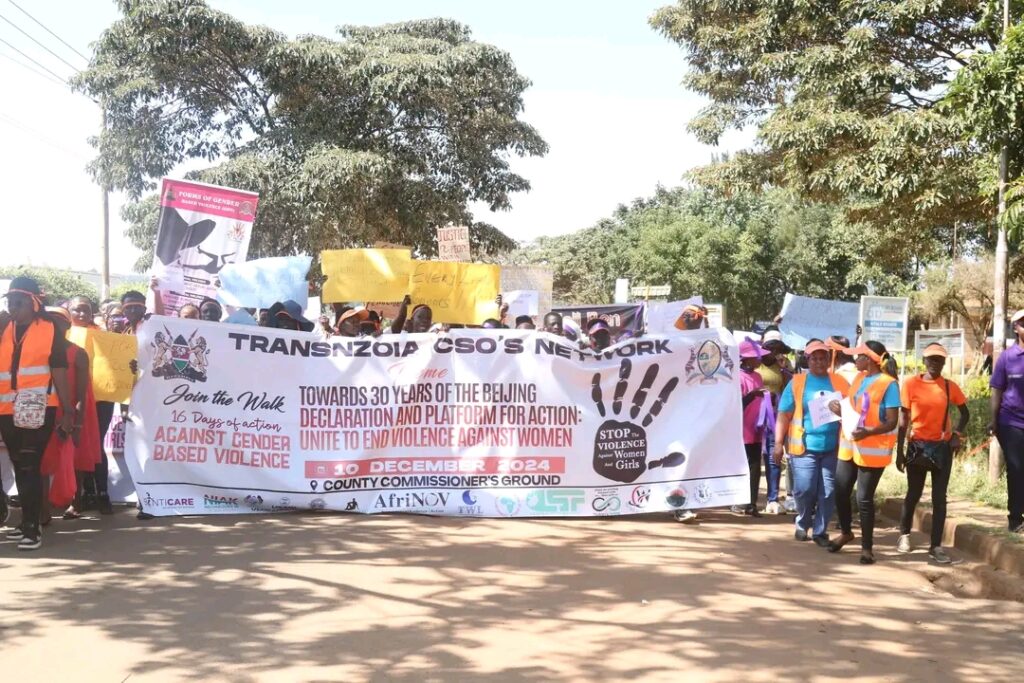Trans Nzoia County Strengthens Fight against Gender-Based Violence

Trans Nzoia County government has pledged to work closely with stakeholders to combat the rising cases of gender-based violence (GBV) within the County.
Speaking after receiving memoranda from women’s rights organizations, County Executive Committee Member for Gender, Youth, Sports, Culture, and Tourism, Patrick Gacheru, expressed concern over the alarming increase in GBV cases, particularly femicide.
“The surge in cases of gender-based violence, both in our county and nationwide, is a serious concern. Femicide, in particular, has become a pressing issue that we must address collectively,” Gacheru said.
The CEC assured the organizations that the county government is expediting the implementation of its newly launched gender-based violence policy. The policy aims to address challenges facing women, youth, and persons living with disabilities.
“We are committed to ensuring that the policy is implemented effectively. This includes increasing budgetary allocations to tackle root causes such as poverty, drug abuse, and unemployment,” Gacheru added.
On the health front, Achieng Trizzer, a clinical psychologist from the Trans Nzoia County Department of Health and Sanitation GBV unit, urged survivors to seek medical and psychological support from the specialized unit at Kitale County Referral Hospital. The unit, supported by USAID AMPATH Uzima, provides comprehensive care for GBV survivors.
“We encourage anyone who has experienced violence to visit our facility for immediate medical attention and counselling. Our unit is equipped to offer holistic support,” Achieng said.
The GBV unit at Kitale County Referral Hospital is a fully operational facility offering medical, psychological, and legal assistance to survivors.
As part of its broader strategy, the county government plans to enhance community sensitization efforts and partner with non-governmental organizations to foster a multi-sectoral approach to ending GBV.
“The fight against gender-based violence requires everyone’s participation,” Gacheru emphasized. “Together, we can create a safer and more inclusive environment for all.”
Trans Nzoia County government has pledged to work closely with stakeholders to combat the rising cases of gender-based violence (GBV) within the County.
Speaking after receiving memoranda from women’s rights organizations, County Executive Committee Member for Gender, Youth, Sports, Culture, and Tourism, Patrick Gacheru, expressed concern over the alarming increase in GBV cases, particularly femicide.
“The surge in cases of gender-based violence, both in our county and nationwide, is a serious concern. Femicide, in particular, has become a pressing issue that we must address collectively,” Gacheru said.
The CEC assured the organizations that the county government is expediting the implementation of its newly launched gender-based violence policy. The policy aims to address challenges facing women, youth, and persons living with disabilities.
“We are committed to ensuring that the policy is implemented effectively. This includes increasing budgetary allocations to tackle root causes such as poverty, drug abuse, and unemployment,” Gacheru added.
On the health front, Achieng Trizzer, a clinical psychologist from the Trans Nzoia County Department of Health and Sanitation GBV unit, urged survivors to seek medical and psychological support from the specialized unit at Kitale County Referral Hospital. The unit, supported by USAID AMPATH Uzima, provides comprehensive care for GBV survivors.
“We encourage anyone who has experienced violence to visit our facility for immediate medical attention and counselling. Our unit is equipped to offer holistic support,” Achieng said.
The GBV unit at Kitale County Referral Hospital is a fully operational facility offering medical, psychological, and legal assistance to survivors.
As part of its broader strategy, the county government plans to enhance community sensitization efforts and partner with non-governmental organizations to foster a multi-sectoral approach to ending GBV.
“The fight against gender-based violence requires everyone’s participation,” Gacheru emphasized. “Together, we can create a safer and more inclusive environment for all.”





